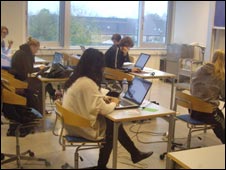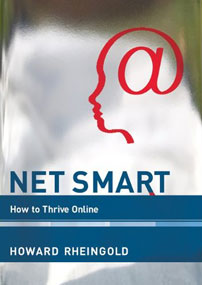 Students sit in the test-taking room, with full access to computers and wireless connections. As they work on national exams, they can be seen accessing the internet from time to time. Are the results from this testing going to be corrupted because these test-takers are not isolated from global information resources?
Students sit in the test-taking room, with full access to computers and wireless connections. As they work on national exams, they can be seen accessing the internet from time to time. Are the results from this testing going to be corrupted because these test-takers are not isolated from global information resources?
Cheating — or high-tech cheating, as it is called today — what is that exactly? How do we define it? And is it really a problem? Do our old-school definitions of cheating need rethinking?
As I visit schools, speak at conferences, and follow great educators and change agents on Twitter, I hear a lot about the skills young people need now. Seems to me we all agree on certain requirements students need to meet if they’re going to succeed as citizens and workers in the 21st century.
The term “21st-century skills” is generally used to refer to certain core competencies such as collaboration, digital literacy, critical thinking, and problem-solving that advocates believe schools need to teach to help students thrive in today’s world. Education Week.
When you look closely at these competencies and think about how students perform on exams, it starts getting complicated. What I am confused about is what qualifies as cheating and what qualifies as a natural aspect of learning today, when students are increasingly expected to apply internet research skills to find specific information in the vast ocean of facts and data.
I’ve been puzzling over this issue lately because my English class at Sandvika High School in Oslo, Norway will be participating this month in a national trial for using the internet during examinations. The Norwegian Department of Education sent out an invitation to all high schools in February, asking for some innovative “connected” schools to take part. The testing will only involve a small number of schools and students — and that makes it even more exciting to me that my school’s application has been accepted and we now we are all set to participate. Jippi!
What Denmark has learned

Denmark student were not allowed to email each other or anyone else during exams. (photo via BBC News)
When I google exams and internet, the only results I find are references to Denmark. I had heard that they allowed the use of internet during certain exams and while researching for this article I started to investigate the outcome. “Back in November 2009, 14 Danish upper secondary schools made history. They became the first in the world to use the internet during written exams. A 2010 follow-up report by a group of auditors concluded that the experiment was a success. The Danish minister of education is quoted: “I am happy that we as the first country in the world had the vision to let students use the internet during their exams. The internet is an integrated part of students’ everyday lives and education so this development is natural. The experiment shows there is a range of positive effects.” Although the ministry provided few details, it did mention “that students can be tested on central IT competencies like motion pictures and audio effects.”
What went on in Denmark classrooms during the testing experiment? A BBC reporter visited one school and filed this feature report. During the exam, students are limited in their internet use and violating the rules is considered cheating, which can carry a severe penalty. The BBC reporter quotes a student as saying, “It’s possible to cheat but I think we have so much respect and self discipline, so we won’t do it.” Here is the most telling part of the BBC story:
The teachers also think the nature of the questions make it harder to cheat in exams. Students are no longer required to regurgitate facts and figures. Instead the emphasis is on their ability to sift through and analyse information.
Minister for education in Denmark, Bertel Haarder, says: “Our exams have to reflect daily life in the classroom and daily life in the classroom has to reflect life in society. The internet is indispensible, including in the exam situation.”
So far so good. If this is a success in Denmark — dating back to 2010 — why aren’t more countries doing this? Minister Haarder predicts: “I’m sure that it would be a matter of a very few years when most European countries will be on the same line.”
The implications for my students
What then are the implications for my students and how will this alter the way they work during the exam? Since Norway’s first experiment involves a small number of students, the exam questions will not be changed in any way. My students will have the exact same exam as other students across the nation — the only difference is that they have full access to the internet. Searching is allowed, communicating with each other during the exam is not. The difference for participating schools is the potential for students to make use of a whole lot of information that doesn’t have to be stored in one’s head.
It’s 2012. The internet has been widely available and expanding exponentially for 20 years or more. Why is looking up information during an exam or test considered cheating? When preparing this post I relied on information found online. That is the way everyone works these days. No one is expected to know or remember all the facts and information available out there.
 The world is constantly changing and keeping up with even the most important new content is simply impossible. Imagine writing about global challenges like famine, drought or global warming without being able to look up any information? (These are topics likely to be addressed in the exam my students are taking). Instead of barring the internet, refusing our students access, we should be teaching them how to filter the information, judge its credibility, and use it to build logical arguments and greater understanding.
The world is constantly changing and keeping up with even the most important new content is simply impossible. Imagine writing about global challenges like famine, drought or global warming without being able to look up any information? (These are topics likely to be addressed in the exam my students are taking). Instead of barring the internet, refusing our students access, we should be teaching them how to filter the information, judge its credibility, and use it to build logical arguments and greater understanding.
We should concentrate on getting our kids online and “Net Smart” (as Howard Rheingold advocates in his new book) instead of offline and ignorant. Searching online can be time consuming, and under the pressure of timed exams, my students will have to be very careful about the minutes they spend searching the Net. That is my main concern. Test-takers who will have access to the internet need to practice: Where will I find reliable sources? How much information do I really need? When must I stop searching and start writing? And how do I document my sources?
When I asked my students to write about this on their blogs, identifying reliable sources and unjust grading seemed to be their main concern. They are afraid that since they have access to all this information, they will be judged differently. The ministry of education has promised this is not going to happen, and the teachers grading these exams will be monitored carefully, we have been told.
I have high expectations! I really hope this is taking us, at least in baby steps (my opinion) towards the future. Honestly, I would like to see both communication and collaboration taking place during exams. Those are two highly valued 21st century skills. But that will not be possible unless we change how our examination questions are designed, in radical ways.
Until then I’m happy doing this! I’ll quote one of my students, Susanne, who wrote: “(M)y class is up for exams in English, and we are allowed to use internet on our exam. It’s like music to my ears.”
Ann Michaelsen recently joined PLP’s new international Board of Advisors. She will write a follow-up after her students participate in Norway’s experiment and share some of the experience with us.
Photo credit: (cheating) BigStock
Ann Michaelsen
Latest posts by Ann Michaelsen (see all)
- Connected Leadership & the Purpose of School - February 2, 2014
- English Learners & Public Blogging - December 4, 2012
- My third ISTE adventure in America! - July 6, 2012


Posted to somebody who had scooped but thought i would crosspost here. Great reflection!
Obviously, part of this issue is assessment design – closely related to what is being assessed (content, skills, etc.). Ultimately, the goal for assessment of digital citizens includes the ability to solve problems utilizing the resources that are commonly at our fingertips (or in our pockets).
That said, if an assessment is primarily or secondarily about recall, accessing outside information defeats that purpose. If the teacher is clear about the parameters of the test and a student violates it, that is cheating. In the US (where we get to struggle with high-stakes tests of all sorts), most standardized tests are designed to measure some (or exclusively) recall.
There are new types of assessments, like the ones you cite, that are similar to the traditional open-note/open-book assessments that call for a higher level of analysis and problem solving or application. These assessments benefit from access to information and can be useful in evaluating how student use time and access to solve problems. More thoughts about this on my blog (shameless plug): http://geekreflection.blogspot.com/2012/04/assessing-21st-century-assessment-meta.html
Thanks for pointing me to your article about assessment. More and more educators are talking and writing about this. I’ve had many reactions to this post and Aaron Sams wrote this post about Open Internet Test. http://chemicalsams.blogspot.com/2011/12/open-internet-tests.html
Aiming for a higher level of analysis and problem solving and allowing the use of internet during tests and exams might be a topic for ISTE in San Diego this summer?
I really like this idea….I’ve been using the concept of Google Jockey to teach students how to search and find basic information. While the objective of my efforts is not high stakes testing, it still is thinking about how to incorporate searching literacy into lesson design.
I think this is a conversation that is just beginning. Keep us abreast of all that is happening….Denmark is leading the way on this.
Would like to receive notices of new postings.
Thought you’ve been a dedicated reader for a few years by now
Interesting idea, and I’m sure this is the way we will go in the end. Two experiences of slightly similar approaches might illuminate:
I remember way back pre-Web when I was doing my university final exams, we were for the first time allowed to bring in notes and books. This was all very new. In the inevitable discussion in the bar afterwards we agreed that no-one had made much use of the resources: we had had to use what we knew and understood from the course, and the occasional reference gave us a fact or a figure we needed. Open-book exams are no longer uncommon.
Fast-forward from the 1970s to the late 2000s and one paper in our exam for 18-year-old school biology students was about practical laboratory work. Students were given the question paper a week in advance and were required to bring to the exam room, and hand in, the laboratory notes they had made. You might expect this paper to be very high-scoring: in fact it was not, and discriminated pretty well across the ability range. The pre-release of the questions and the requirement for the laboratory notes removed the need for mechanical memorisation and recall, and instead higher-order analytical skills could be tested.